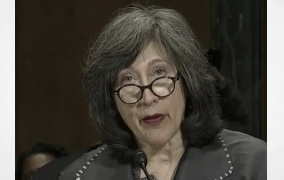“Ms. Nisbet spoke on behalf of five library Associations before the House Energy and Commerce Committee’s Subcommittee on Commerce, Trade and Consumer Protection”
WASHINGTON — Speaking on behalf of the American Library Association (ALA), the American Association of Law Libraries, the Association of Research Libraries, the Medical Library Association, and the Special Libraries Association, ALA Legislative Counsel Miriam M. Nisbet urged members of the House Energy and Commerce Committee’s Subcommittee on Commerce, Trade and Consumer Protection to fully support H.R. 107, the Digital Media Consumers’ Rights Act (DMCRA). Together, the five national associations represent over 85,000 librarians and thousands of libraries across the country, and millions of others who use libraries.
In her testimony, Ms. Nisbet reminded lawmakers “copyright law has traditionally sought to strike a balance that accommodates both the ability of the copyright owner to exploit his or her works commercially, and the societal need to use those works for education, research, and public knowledge.” The law, she continues, “provides that in some circumstances, there are some uses of copyrighted works that do not require permission from the copyright holder. For libraries and schools, these provisions include fair use, first sale, inter-library loan, preservation copying, and distance education.”
The 1998 Digital Millennium Copyright Act (DMCA) provided additional protections for copyright owners, but at the same time omitted corresponding allowances for fair use and other exceptions. The Digital Media Consumers’ Rights Act (DMCRA) is widely viewed by some as the first significant digital rights bill, and a credible attempt to modify some of the excesses in the Digital Millennium Copyright Act (DMCA).
“Simply put, the DMCA is broken, and it needs to be fixed. To begin to do that, the Library community strongly believes that the Digital Media Consumers’ Rights Act (DMCRA) is needed in order to restore a proper balance in copyright law between the rights of copyright users and the rights of copyright owners,” said Ms. Nisbet. “Such a balance is essential to the future conduct of research and education in the digital age, and it will ensure that our society remains committed to the principle that information is the true currency of democracy,” she concluded.




